- Home
- Scott Mariani
House of War Page 2
House of War Read online
Page 2
And so here he was, heading briskly along the street, his scuffed brown leather jacket zipped against the chill and the third Gauloise of the day dangling from his lip, in the direction of a local coffee bar where he could get some breakfast and a much-needed fix of the black stuff. It was a five-minute stroll, but when he got there he discovered to his chagrin that the coffee bar had had its windows smashed in last night’s disturbances and was shut.
The owners weren’t the only local traders to have suffered damage from the latest round of protests. All up and down the street, storekeepers were resignedly sweeping up broken glass, nailing plywood sheets over their shattered windows, hauling out buckets of hot soapy water to try and scrub away graffiti that had appeared overnight. Ben stopped for a brief conversation with Habib, who ran the little Moroccan grocery store and tobacconist’s where he’d often bought his cigarettes. Habib expressed sympathy with the protesters but worried that his insurance premiums would sky-rocket if these riots kept up. Ben offered his commiserations, wished Habib good luck and walked on in search of breakfast. He still had plenty of time to kill before meeting Gerbier.
The signs of last night’s troubles were all around. Though it hadn’t rained overnight the roads and pavements were slicked wet, small rivers created by police water cannon trickling in the gutters and pooling around washed-up garbage that choked the drain grids. A recovery crew with a flatbed lorry were removing the burnt-out shells of three cars that had been torched by the protesters. Barriers and cones had reduced the traffic to a crawl as cars and vans and motorcycles threaded their way along streets still littered with riot debris and spent tear gas canisters.
As Ben walked along, he spied one rolling in the gutter and picked it up to examine it, just out of curiosity. It was the strong stuff, the real McCoy. Then again, France’s riot police never had mucked about when it came to dispersing violent demonstrations. The warning on the empty canister said, in French: DANGER – DO NOT FIRE DIRECTLY AT PERSON(S) AS SEVERE INJURY OR DEATH MAY RESULT. Ben had seen from the online news headlines that a couple of civilians had already been accidentally killed that way as the protests mounted. There was a good chance of more fatalities to come. One serious casualty among the police, and the government would probably send in the army.
Ben continued on his way, thinking about Gerbier’s words and wondering where, indeed, it was all going to end. As he’d grown older and wiser he had come to understand that history was the key to predicting what lay in the future. As the saying went, those who failed to learn from the hard lessons of the past were doomed to repeat them. Paris had seen more than its fair share of revolutionary unrest in its time, and none of it seemed to have done much good. The big one of 1789 had kicked off much the same way as was happening now – and look how that ended, eating itself in an orgy of blood and severed heads and giving rise to the Napoleonic empire and rather a lot of even bloodier wars, followed eventually by a new monarchy to take the place of the old. Then had come the July Revolution of 1830, the one portrayed in the famous Delacroix painting that used to be on the old 100-franc banknote, depicting the topless Liberty wielding tricolour flag and musket as she led the people to victory, this time against the royal regime of Charles X. Same dubious result. Then just eighteen years later they’d been at it again, with the populist uprising of 1848 that had spilled enough blood in the streets of Paris to tear down the establishment once more and trigger the foundation of the Second Republic, which lasted exactly three years before the Second Empire turned the country back into a de facto monarchy.
And on, and on, through the ages and right up to the present. Round and round we go, Ben thought. An endless cycle of inflamed passion leading to disappointment, and resentment, and blame, simmering away and slowly building up to the next outburst. And for what? So much suffering and destruction could only deepen the rift between nation and state, while calls for reform would largely go unheeded and life would ultimately carry on just like before. Sure, go ahead and protest about overinflated taxes and rising costs of living and the insidious encroachment of the European superstate and police brutality and human rights infringements and loss of personal freedoms and privacy and anything else you feel strongly about. All fine. Angry mobs ripping their own beautiful city apart, looting and pillaging, harming small businesses, traumatising innocent citizens, not so fine. Unless you really believed that a violent street revolution was the only possible way to change things for the better.
Well, good luck with that.
Those were all the things on Ben’s mind as he walked quickly around the corner of Rue Georges Brassens and collided with a young woman who, quite literally, ran into him without looking where she was going.
He didn’t know it yet, but fate had just launched another of those bolts from the blue at him.
Chapter 2
The woman crashed straight into Ben with enough force to knock the wind out of herself and send her tumbling to the pavement. It took Ben a moment to recover from his own surprise.
Though it hadn’t been his fault, he said in French, ‘Oh, I’m so sorry,’ and went to help her to her feet. He’d become skilled at languages back during his time with Special Forces, learning Arabic, Dari, Farsi and some African dialects, along with various European languages. He had now been living in France long enough to virtually pass for a native speaker.
As she picked herself off the pavement he saw she was more stunned than hurt. She was maybe twenty-five years old and slender, wearing a long camel coat over a white cashmere roll-neck top and navy trousers. Her hair was sandy-blond and her face, if it hadn’t been flushed with shock, was attractively heart-shaped with vivid eyes the same blue as Ben’s own. She didn’t look as though she weighed very much, but it had been quite a collision. The little leather satchel she’d been carrying on a shoulder strap had fallen to the pavement and burst open, scattering its contents.
‘Are you okay?’ Ben asked her. She seemed too flustered to reply, and kept looking anxiously behind her as though she expected to see someone there. A couple of passersby had paused to gawk, but quickly lost interest and walked on. Ben said, ‘Miss? Are you all right?’
The woman looked at him as though noticing him for the first time. Her blue eyes widened with alarm. She backed away a couple of steps, plainly frightened of him. He held his arms to the sides and showed her his open palms. ‘I mean no harm,’ he said jokingly. ‘You’re the one who ran into me. Maybe you should look where you’re going. Here, let me help you with your things.’
He crouched down to pick up her fallen satchel. Her purse had fallen out, along with a hairbrush, some hair ties, a book of Métro tickets and a little black plastic case that said GIVENCHY in gold lettering. The contents of women’s handbags had always been a bit of a mystery to Ben. He was also aware of the delicacy of the situation as he quickly scooped up her personal items from the pavement. She paid no attention while he retrieved her things, apparently too distracted by whatever, or whoever, she seemed to think was lurking in the background. When Ben stood up and offered the satchel back to her, she reached out tentatively and snatched it from his hands like a nervous animal accepting a titbit from a strange and untrusted human.
So much for being a knight in shining armour.
‘You’re bleeding,’ he said, noticing that she’d scuffed the side of her left hand in the fall. ‘Doesn’t look too bad, but you should put some antiseptic on it.’
Still the same terse silence. She turned her anxious gaze behind her again, scanning the street as though she thought she was being followed. Pedestrians walked by, paying no attention. The traffic stream kept rumbling past in the background. A municipal cleaning crew was slowly working its way along the street towards them, gathering up last night’s wreckage. A couple of pigeons strutted and pecked about among the debris in the gutter, seemingly unbothered by whatever was frightening the woman. Then she quickly looped the strap of her satchel over her shoulder and hurried on without a word or another glan
ce at him.
Ben watched her disappear off down Rue Georges Brassens, walking so fast she was almost running, still glancing behind her every few steps as if someone was chasing her.
He shook his head. Some people. What the hell was up with her? The way she’d acted with him, anyone would think he’d been about to attack her. And who did she think was coming after her?
Maybe she was an escaped lunatic. Or a bank robber fleeing from the scene of the crime. Perhaps some kind of political activist or protest organiser the cops were trying to round up and throw in jail along with the other thousand-odd they’d already locked up.
Ben looked around him and saw no squads of gendarmes or psychiatric ward nurses tearing down the street in pursuit. Nor anyone else of interest, apart from the usual passersby who were all just going about their business, the majority of them deeply absorbed in their phones as most people seemed to be nowadays, doing the thumb-twiddling texting thing as they ambled along and somehow managed to avoid stumbling into trees and signposts. It seemed to him that those without digital devices to distract them from their present reality were walking somewhat more briskly than normal, a little stiff in their body language as if trying hard not to take in too much of their surroundings and dwell at any length on the signs of the battlefield that their city environment had become.
One way or another, though, the Parisians had far too much on their minds to be worrying about some panic-stricken woman running down the street blindly crashing into people.
Ben shrugged his shoulders and was about to move on when he saw that the young woman had dropped something else on the ground. She’d been so distracted that she had failed to notice that her phone had bounced off the kerbside and into the gutter, where it was lying among the washed-up debris and broken bottles the cleaning crew hadn’t yet reached.
He picked it up. A slim, new-model smartphone in a smart black leather wallet case. The leather was wet, but the phone inside was dry. There was no question that it hadn’t been lying in the gutter for long, and that it belonged to the woman. He could feel the residual trace of warmth from where it had been nestling in her bag close to her body. In an age when people’s phones seemed to have become the hub of their entire lives, she must have been in a hell of a preoccupied state of mind not to have noticed its absence.
Ben stood there for a moment, thinking what he should do. Further along the street he could see the striped red and white awning of a café-bistro that had obviously escaped damage and was open for business. His mouth watered at the thought of coffee and croissants and he was torn between the temptation of breakfast and the notion of going after the woman to return her phone. She was well out of sight by now, and could have turned off onto any number of side streets. He decided on breakfast and slipped the phone into his pocket.
The place was bustling and noisy, but there was a table free in a corner. Out of habit, Ben sat with his back to the wall so he could observe the entrance. A hurried waiter took his order for a large café noir and the compulsory fresh-baked croissant.
While he waited for his order to arrive, Ben sat quietly and absorbed the chatter from other customers. Predictably the subject of the day, here as everywhere in the city, was the riots. A pair of middle-aged men at the next table were getting quite animated over whether or not the president should declare martial law, order the rebuilding of the Bastille prison, stuff the whole lot of troublemakers behind bars and throw away the key.
When his breakfast arrived Ben gave up eavesdropping on their conversation, took a sip or two of the delicious coffee and tore off a corner of croissant to dunk into his cup. A Gauloise would have rounded things out nicely, but such pleasures as smoking inside a café were no longer to be had in the modern civilised world. He went back to thinking about the strange woman who had bumped into him. What was she so frightened of? Where had she been running from, or to? He had to admit it, he was intrigued. And sooner or later, he was going to have to do something about the phone in his pocket.
Curiosity getting the better of him, he took it out to examine more closely. If the screen happened to be locked, there might not be much he could do except just hand it in to the nearest gendarmerie as lost property. But when he flipped open the leather wallet he soon discovered that the phone wasn’t locked.
Which left him a number of potential ways to find out who the woman was and where she lived, allowing him to return the item to her personally. Ben was good at finding people. It was something he used to do for a living, after he’d quit the SAS to go his own way as what he’d euphemistically termed a ‘crisis response consultant’. A career that involved tracking down people who didn’t always want to be found, especially when they were holding innocent child hostages captive for ransom. Kidnappers didn’t make themselves easy to locate, as a rule. But Ben had located them anyway, and the consequences hadn’t been very pleasant for them.
By contrast, thanks to today’s technology, ordinary unsuspecting citizens were easy to track down. Too easy, in his opinion.
Feeling just a little self-conscious about intruding on her privacy, he scrolled around the phone’s menus. There were a few emails and assorted files, but his first port of call was the woman’s address book. She was conservative about what information she stored in her contacts list. There was someone called Michel, no surname, and another contact called ‘Maman/Papa’, obviously her parents, but no addresses for either, and no home address or home landline number for herself. But the mobile’s own number was there.
Ben took out his own phone to check it with. Damn these bloody things, but he was just as bound to them as the next guy. He’d got into the habit of carrying two of them: one a fancy smartphone registered to his business, the other a cheap, anonymous burner bought for cash, no names, no questions. Its anonymity pleased him and it came in handy in certain circumstances. But for this call he used his smartphone. He punched in the woman’s mobile number. Her phone rang in his other hand. You could tell a lot about a person from their choice of ringtone. Hers was a retro-style dring-dring, like the old dial phone that stood in the hallway of the farmhouse at Le Val. Ben liked that about her. He ended the call and the ringing stopped. So far, so good.
Next he used his smartphone to access the whitepages.fr people finder website, which scanned millions of data files to give a reverse lookup. When a prompt appeared he entered the woman’s mobile number and activated the search. Not all phone users were trackable this way, only a few hundred million worldwide. Which was a pretty large net, but still something of a gamble. If it didn’t pay off, he still had other options to try.
But that wouldn’t be necessary, because he scored a hit first time. In a few seconds he’d gained access to a whole range of information about the mystery woman: name, address, landline number, employer, and the contact details of two extant relatives in the Parisian suburb of Fontenay-sous-Bois a few kilometres to the east. If he’d been interested in offering her a job, he could run a background check to verify her credentials and see if she had any criminal record. If he was thinking of lending her money, he could view her credit rating. As things stood, he only needed the basics, which he now had.
Piece of cake.
Her name was Mme Romy Juneau. All adult women in France were now officially titled Madame regardless of marital status, since the traditional Mademoiselle had been banned for its alleged sexist overtones. But her parents’ shared surname matched hers, suggesting she was unmarried. Some traditions still prevailed. Ben guessed that the phone contact called Michel was probably a boyfriend. She worked at a place called Institut Culturel Segal, ICS for short. The Segal Cultural Institute, whatever that was, in an upmarket part of town on Avenue des Champs-Élysées.
More important to Ben at this moment was her home address, which was an apartment number in a street just a few minutes’ walk from where he was sitting right now, and in the direction she’d been heading when they’d bumped into one another.
It seemed safe to assume t
hat she hadn’t been going to work that morning. Maybe she had the day off. Whatever the case, it was a reasonable assumption that she’d been making her way home. From where, he couldn’t say, and it didn’t really matter. If she was heading for her apartment, there was a strong likelihood that she’d have got there by now, considering the hurry she’d been in.
Ben scribbled her details in the little notebook he carried, then exited the whitepages website and punched in Romy Juneau’s landline number. As he listened to the dialling tone, he thought about what he’d say to her.
No reply. Perhaps she hadn’t got home yet, or was in the bathroom, or any number of possibilities. Ben aborted the call and looked at his watch. The morning was wearing on. He needed to be thinking about finishing breakfast and heading over to see Gerbier at his offices across town. Romy Juneau would have to wait until afterwards.
He was slurping down the last of the delicious coffee when his phone buzzed. He answered quickly, thinking that Romy must have just missed his call and was calling him back. His anticipation soon fell flat when he heard the unpleasantly raspy, reedy voice of Gaston Gerbier in his ear.
The estate agent was calling, very apologetically, to cancel their morning appointment because his hundred-year-old mother had started complaining of chest pains and been rushed off to hospital. It was probably nothing serious, Gerbier explained. The vicious old moo had been dying of the same heart attack for the last thirty-odd years and false alarms were a routine thing. Still, he felt obliged to be there, as the dutiful son, etc., etc. Ben said it was no problem; they could reschedule the appointment for next time he was in town. He wished the old moo a speedy recovery and hung up.
There went his morning’s duties. Ben couldn’t actually say he was sorry to be missing out on the joys of Gerbier’s company. And never mind about the apartment. It wasn’t going anywhere. With a suddenly empty slate and nothing better to do, he decided now was as good a time as any to play the Good Samaritan and deliver the lost phone back to its owner in person. Given the nervous way she’d acted around him before, so as not to freak her out still further by showing up at her door he’d just post it through her letterbox with a note explaining how he’d found it. And that would be that. His good deed done, he could wend his way back to his apartment, jump in the car and be home at Le Val sometime in the afternoon.

 Valley of Death
Valley of Death House of War
House of War The Pandemic Plot
The Pandemic Plot The Pretender's Gold
The Pretender's Gold The Demon Club
The Demon Club Passenger 13 (Ben Hope eBook originals)
Passenger 13 (Ben Hope eBook originals)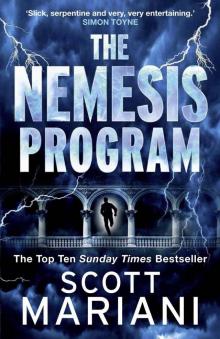 The Nemesis Program_Ben Hope
The Nemesis Program_Ben Hope The Shadow Project
The Shadow Project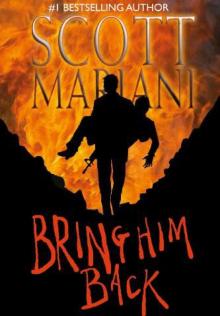 Bring Him Back
Bring Him Back Passenger 13
Passenger 13 Sacred Sword (Ben Hope 7)
Sacred Sword (Ben Hope 7) The Sacred Sword (Ben Hope 7)
The Sacred Sword (Ben Hope 7) Sacred Sword
Sacred Sword The Babylon Idol
The Babylon Idol The Armada Legacy
The Armada Legacy The Heretic's Treasure
The Heretic's Treasure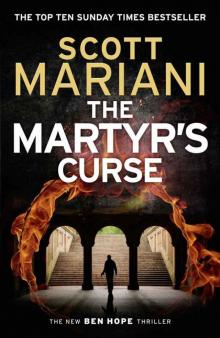 The Martyr’s Curse
The Martyr’s Curse DECOY (Kindle Single)
DECOY (Kindle Single) The Bach Manuscript
The Bach Manuscript The Alchemist's Secret
The Alchemist's Secret The Mozart Conspiracy: A Novel bh-2
The Mozart Conspiracy: A Novel bh-2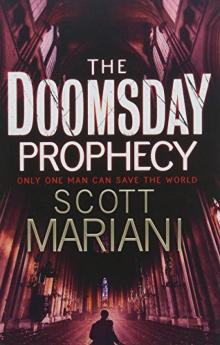 The Doomsday Prophecy
The Doomsday Prophecy The Ben Hope Collection: 6 BOOK SET
The Ben Hope Collection: 6 BOOK SET Star of Africa (Ben Hope, Book 13)
Star of Africa (Ben Hope, Book 13) Star of Africa
Star of Africa The Forgotten Holocaust (Ben Hope, Book 10)
The Forgotten Holocaust (Ben Hope, Book 10) The Devil's Kingdom
The Devil's Kingdom The Lost Relic
The Lost Relic The Armada Legacy bh-8
The Armada Legacy bh-8 The Rebel's Revenge
The Rebel's Revenge The Forgotten Holocaust
The Forgotten Holocaust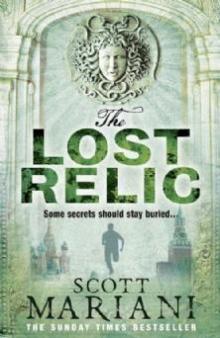 The Lost Relic bh-6
The Lost Relic bh-6 Ben Hope 05 - The Shadow Project
Ben Hope 05 - The Shadow Project The Mozart Conspiracy
The Mozart Conspiracy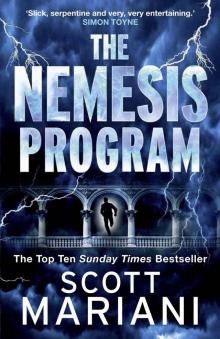 The Nemesis Program
The Nemesis Program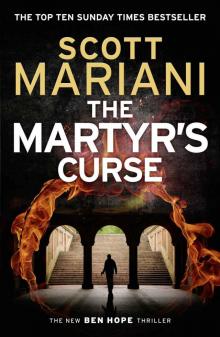 The Martyr’s Curse (Ben Hope, Book 11)
The Martyr’s Curse (Ben Hope, Book 11) THE TUNNEL: A Ben Hope Story
THE TUNNEL: A Ben Hope Story The Sacred Sword bh-7
The Sacred Sword bh-7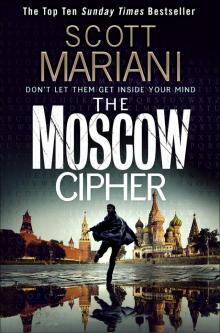 The Moscow Cipher
The Moscow Cipher The Shadow Project bh-5
The Shadow Project bh-5 The Tunnel
The Tunnel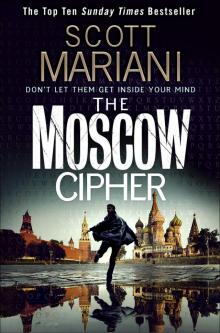 The Moscow Cipher (Ben Hope, Book 17)
The Moscow Cipher (Ben Hope, Book 17)